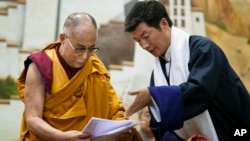Tibet's government-in-exile is unveiling a renewed bid for greater autonomy from China, in an effort to counteract Chinese government propaganda and reinvigorate disenchanted Tibetans.
It has been four years since talks stalled between China and representatives of the Tibetan spiritual leader, the Dalai Lama. Since then, conditions in Tibet have worsened and a wave of self-immolations has expanded.
As the violence and oppression continues, some exiled Tibetans have grown impatient with the Dalai Lama's so-called" Middle Way" approach, which aims to achieve autonomy, but not independence, from Beijing.
On Thursday, the India-based Central Tibetan Administration announced an "international awareness campaign," which it called its "most concerted effort to date to bring about basic freedom for Tibetan people."
Tsering Wangchuk, a press officer with the Central Tibetan Administration, told VOA the campaign is not only a call for solidarity, but also a response to China's distortion of its message.
"The awareness campaign is to counter the misrepresentation by Chinese government representatives about the Middle Way and the Tibetan government's call and the Dalai Lama's call for the peaceful resolution for the Tibetan issue. The Chinese government in the past few years has been aggressively misconstruing the actual call of the Tibetan people."
China has tried to portray the Dalai Lama as a dangerous separatist who has incited the 130 self-immolations that have taken place since 2009. The Dalai Lama rejects the accusations.
Many had hoped China's top leader Xi Jinping, who came to power in 2012, would be more open to dialogue on the Tibet issue, since his late father was a former vice premier who had a close relationship with the Dalai Lama.
John Powers of the Australian National University told VOA those hopes appear for now to be unfounded.
"It's very clear that China has no intention at all of holding any kind of talks of any substance, so a lot of people are wondering if a more proactive approach might be better."
Powers, an Asian studies professor with extensive experience on Tibet, said this concern is especially noticeable in the Tibetan exile community.
"The Dalai Lama is still of course very popular and very well regarded. But he's been trying this "Middle Way" approach for more than 50 years now and nothing substantive has come of it."
Powers said it is probably not a coincidence the awareness campaign comes just after the 25th anniversary of the Tiananmen Square massacre, when there is renewed interest in what he calls China's "oppressive system."
The Dalai Lama this week released a statement saying he prayed "for those who died for freedom, democracy and human rights" in the Tiananmen Square pro-democracy protests in 1989.
China's Foreign Ministry angrily rejected the statement as having "ulterior motives and harbors evil intentions."
It has been four years since talks stalled between China and representatives of the Tibetan spiritual leader, the Dalai Lama. Since then, conditions in Tibet have worsened and a wave of self-immolations has expanded.
As the violence and oppression continues, some exiled Tibetans have grown impatient with the Dalai Lama's so-called" Middle Way" approach, which aims to achieve autonomy, but not independence, from Beijing.
On Thursday, the India-based Central Tibetan Administration announced an "international awareness campaign," which it called its "most concerted effort to date to bring about basic freedom for Tibetan people."
Tsering Wangchuk, a press officer with the Central Tibetan Administration, told VOA the campaign is not only a call for solidarity, but also a response to China's distortion of its message.
"The awareness campaign is to counter the misrepresentation by Chinese government representatives about the Middle Way and the Tibetan government's call and the Dalai Lama's call for the peaceful resolution for the Tibetan issue. The Chinese government in the past few years has been aggressively misconstruing the actual call of the Tibetan people."
China has tried to portray the Dalai Lama as a dangerous separatist who has incited the 130 self-immolations that have taken place since 2009. The Dalai Lama rejects the accusations.
Many had hoped China's top leader Xi Jinping, who came to power in 2012, would be more open to dialogue on the Tibet issue, since his late father was a former vice premier who had a close relationship with the Dalai Lama.
John Powers of the Australian National University told VOA those hopes appear for now to be unfounded.
"It's very clear that China has no intention at all of holding any kind of talks of any substance, so a lot of people are wondering if a more proactive approach might be better."
Powers, an Asian studies professor with extensive experience on Tibet, said this concern is especially noticeable in the Tibetan exile community.
"The Dalai Lama is still of course very popular and very well regarded. But he's been trying this "Middle Way" approach for more than 50 years now and nothing substantive has come of it."
Powers said it is probably not a coincidence the awareness campaign comes just after the 25th anniversary of the Tiananmen Square massacre, when there is renewed interest in what he calls China's "oppressive system."
The Dalai Lama this week released a statement saying he prayed "for those who died for freedom, democracy and human rights" in the Tiananmen Square pro-democracy protests in 1989.
China's Foreign Ministry angrily rejected the statement as having "ulterior motives and harbors evil intentions."




